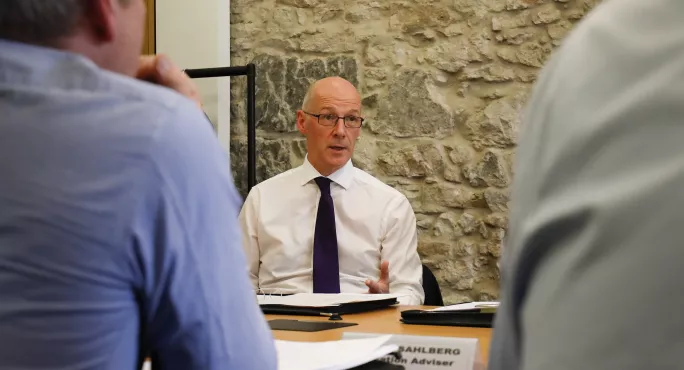- Home
- Scotland’s Education Bill is shelved
Scotland’s Education Bill is shelved

Long-awaited legislation which would have given more powers to schools in Scotland has been delayed and may never come to pass, it has emerged this afternoon.
Education secretary John Swinney (pictured) has published a draft Education Bill today, but will give councils a chance to show that they can improve performance without a change in the law and has insisted that he is now “fast-tracking” educational reform.
Opposition politicians, however, have accused Mr Swinney of presiding over a “shambles” and described today’s announcement as “humiliating” for him.
The Bill was intended to introduce a new “Headteachers’ Charter”, giving school leaders more responsibility for the curriculum, staffing and school finances, but Mr Swinney has struggled to secure cross-party support.
The Bill also envisaged “Regional Improvement Collaboratives” to drive school improvement across council boundaries, which have already been set up. Another controversial plan would have seen the General Teaching Council for Scotland (GTCS) replaced by an Education Workforce Council, covering a wider range of education workers, but instead, he now wants the existing GTCS to broaden its membership.
This afternoon, Mr Swinney said in Parliament: “I am today fast-tracking the reform of Scottish education.”
He explained that the government and Scotland’s local councils had reached an agreement that meant there should be no 18-month wait for an Education Bill to come into force; the draft Bill was published today but not introduced to Parliament.
This agreement, Mr Swinney said, “endorses and embraces the principles of school empowerment and provides clear commitment to a school - and teacher-led - education system”.
He added: “This means that the Headteachers’ Charter can become a reality faster. School leaders will be able to make the key decisions on the crucial areas of curriculum, improvement, staffing and budget - crucial to ensuring effective learning and teaching - and more quickly taking these actions.”
On the decision that the GTCS should not be replaced, he said he wanted instead to “explore what can be done - within the scope of current legislation - to provide the benefits of regulation and registration to a wider group of education professionals”. Concerns had been raised about teachers’ influence being diluted by a new body, and Mr Swinney said he accepted “the strength of feeling from teachers about the body’s independence and its guardianship of professional standards”.
He also announced a £46 million three-year funding package to support education reform and continue improvements in attainment.
Mr Swinney addressed Parliament only two hours after the publication of the first formal report by the government’s International Council of Education Advisors, which warned that it should avoid an over-reliance on legislation to drive educational reform. The advisors also cautioned that giving schools more power, if handled badly, risks opening the door to market-driven approaches that would damage education in Scotland.
Scottish Conservative shadow education secretary Liz Smith said: “This could have been the best chance in a generation to make improvements to schools, handing real power to headteachers to improve literacy and numeracy. Instead, the plans have been dumped.”
She added: “The Scottish Conservatives were - and remain - willing to work with the SNP government to restore standards in Scottish education. The problem is that [first minister] Nicola Sturgeon won’t allow her party to work with the Scottish Conservatives, however, so schools are made to suffer.”
Labour education spokesman Iain Gray described today’s developments as a “shambles”, while the Greens’ Ross Greer said it was a “humiliating moment” for Mr Swinney.
Stephen McCabe, children and young people spokesman for local authorities body Cosla, said he was “pleased” that concerns about the Bill have been “recognised by the Scottish government, and I believe that the principles we have agreed will allow us to focus on improving outcomes for children and young people”.
EIS union general secretary Larry Flanagan said today’s announcement would “grant Scottish education the breathing space that teachers have been asking for”.
He added: “However, whilst the EIS welcomes the partnership approach agreed between national and local government, we are clear that such an approach must be extended beyond politicians to include the profession itself and in particular teacher trade unions such as the EIS.”
The EIS “supports the ambition of an empowered profession” but says this requires “significant investment” and that “excessive workload be addressed so that teachers have time to engage in professional development”.
Mr Flanagan also welcomed that the education secretary “now seems to have been abandoned...the suggestion of scrapping the General Teaching Council for Scotland”.
Keep reading for just £1 per month
You've reached your limit of free articles this month. Subscribe for £1 per month for three months and get:
- Unlimited access to all Tes magazine content
- Exclusive subscriber-only stories
- Award-winning email newsletters



